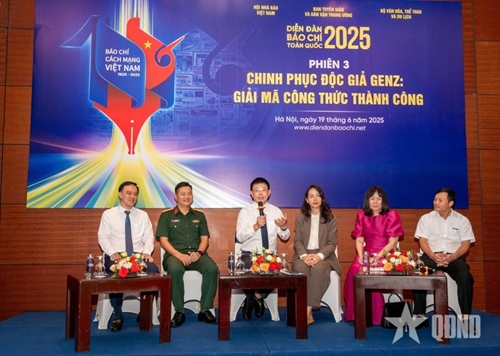The opening ceremony was attended by Vice Chairman of the Party Central Committee’s Commission for Information, Education and Mass Mobilization, Editor-in-Chief of Nhan Dan Newspaper, and Chairman of the Vietnam Journalists’ Association (VJA) Le Quoc Minh; Standing Deputy Minister of Culture, Sports and Tourism Le Hai Binh, and Deputy General Director of the Vietnam News Agency Nguyen Thi Su.
    |
 |
|
A view of the third thematic discussion (Photo: qdnd.vn) |
During the two-day course, the forum will feature opening and closing ceremonies and 10 thematic discussions tackling critical newsroom issues.
A hub for sharing best practices, the event aims to forge solutions for financial sustainability, public media contracts, audience engagement, content innovation, and newsroom restructuring. It is also a moment for Vietnam’s media to accelerate its progress and figure out what the “revolutionary press” means in a new era.
In a keynote address, Minh urged newsrooms to double down on high-value, original content that artificial intelligence (AI) cannot replicate, saying that quality and authenticity are the only way to restore the public's trust in a market flooded with AI-generated materials.
He pushed for sweeping digital transformation, calling for investments in technology infrastructure, robust content and reader databases, and modern content management systems. Seamless integration across websites, mobile apps, and social media, backed by advanced analytics and engagement tools, was central to his vision.
Minh highlighted AI’s potential to transform journalism, from automating short-form news like sports and weather updates to improving editing, translation, fact-checking, and fake news detection. He also advocated diversifying into data journalism, podcasts, e-magazines, subscription newsletters, internet TV, and digital events, while tapping new revenue streams like communication services and third-party platforms.
To counter revenue pressures, he proposed moving beyond advertisement dependence toward models like premium or freemium subscriptions, event hosting, communications services, content licensing, digital platform monetization, and sponsored editorial content. He stressed building credible, objective brands with exclusive reporting to retain younger audiences on platforms like YouTube and podcasts.
The VJA has already trained around 2,000 journalists in AI applications, with many from local media outlets. The goal is to train 3,000 more by the year-end, with 10,000 total in sight, he said.
Following the opening ceremony, 10 thematic sessions bring together media leaders, veteran journalists, and renowned international media experts. Poised as a regionally significant event, the event is a warm-up for the 100th anniversary of Vietnamese Revolutionary Press Day (June 21), with the media sector determined to adapt and thrive.
Source: VNA